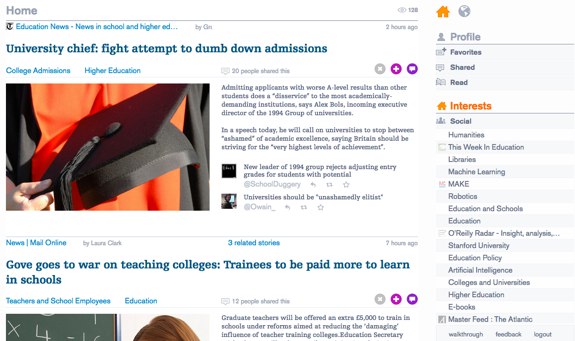You have /5 articles left.
Sign up for a free account or log in.
It’s been several months now since I cleaned all the tech blogs out of my RSS reader, a process that I talked about here. Needless to say, I haven’t added them back.
I don’t miss them. But I do worry that, as an education technology writer, that I’ll miss an important story. And I worry about filter bubbles.
I do still subscribe to a lot of blogs, I should clarify. Just not the tech blogs – not the Techcrunches, et al. And as I noted before, in lieu of RSS feeds I follow Twitter lists. I use these to monitor various news publications (world news and “breaking news,” as well as education and technology news). I follow quite a few Twitter lists in fact: one for ed-tech startups, one for educators, and one for journalists. Twitter works pretty well for surfacing interesting and importnt stories.
Lately, I’ve started experimenting with Prismatic, a “social news” discovery app. I've been reluctant to adopt this sort of tool (Prismatic's competitors include Flipboard, Zite, and News.me) as I've never been fully convinced that they do much more than just re-present the links shared by popular Twitter users. If I'm to adopt an app like this, it has to offer more value than what I get from my current blend of Twitter and Google reader usage. I want to use it to uncover the stories that I might not otherwise see – because they’re not in my news feed, because they zoom by on Twitter, because I just didn’t know the source or notice.
Prismatic connects to your Twitter, Facebook, and Google Reader profiles (linking to a Twitter account is required; the other two are new and optional features). Prismatic examines your Twitter activity and analyzes what you share, who you follow in order to identify your interests. From there it recommends stories to you. You can X out ones that aren’t relevant, and you can favorite and share ones you like, something that in turn helps refine its recommendations for you.

Prismatic does this really well, a testament to its algorithms and the data chops of its founding team: Branford Cross and Aria Haghighi. (Cross founded Flightcaster, a company that predicted flight delays, and Haghighi was part of Stanford’s AI Lab). I've been really pleased with what it's surfaced for me -- highly relevant content, yet articles that I might not have otherwise read.
It feels like a great trade-off: I've emptied out my feed reader of the things I didn't want to read. I rely on Twitter lists to keep an eye on the things that I must (or at least the headlines). And for all else, I'm using Prismatic.





